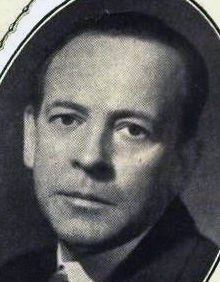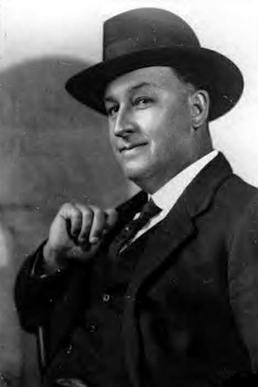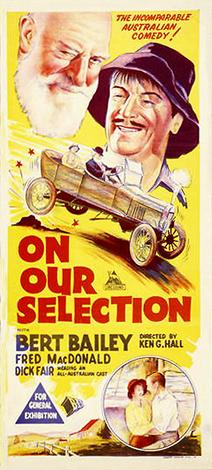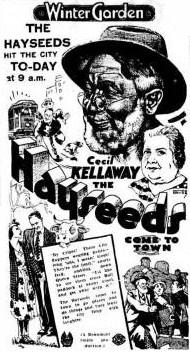Related Research Articles

Kenneth George Hall was an Australian film producer and director, considered one of the most important figures in the history of the Australian film industry. He was the first Australian to win an Academy Award.

Cinesound Productions Pty Ltd was an Australian feature film production company. Established in June 1931, Cinesound developed out of a group of companies centred on Greater Union Theatres that covered all facets of the film process, from production to distribution and exhibition. Cinesound Productions established a film studio as a subsidiary of Greater Union Theatres Pty Ltd based on the Hollywood model. The first production was On Our Selection (1932), which was an enormous financial success.
Get-Rich-Quick Wallingford is a 1916 Australian silent comedy film directed by Fred Niblo. The film was the first made by the film unit of theatrical firm J. C. Williamson, although it was one of the last to be released. It was Niblo's debut film as a director and is considered a lost film.

Frank Harvey was a British-born actor, producer, and writer, best known for his work in Australia.

Raymond Longford was a prolific Australian film director, writer, producer, and actor during the silent era. Longford was a major director of the silent film era of the Australian cinema. He formed a production team with Lottie Lyell. His contributions to Australian cinema with his ongoing collaborations with Lyell, including The Sentimental Bloke (1919) and The Blue Mountains Mystery (1921), prompted the Australian Film Institute's AFI Raymond Longford Award, inaugurated in 1968, to be named in his honour.

On Our Selection is a 1932 comedy based on the Dad and Dave stories by Steele Rudd. These had been turned into a popular play by Bert Bailey and Edmund Duggan in 1912, which formed the basis for the screenplay. Bailey repeats his stage role as Dad Rudd. He also wrote the script with director Ken G. Hall.
The Squatter's Daughter is a 1933 Australian melodrama directed by Ken G. Hall and starring Jocelyn Howarth. One of the most popular Australian films of the 1930s, it is based on a 1907 play by Bert Bailey and Edmund Duggan which had been previously adapted to the screen in 1910.
The Silence of Dean Maitland is a 1934 Australian film directed by Ken G. Hall, and based on Maxwell Gray's 1886 novel of the same name. It was one of the most popular Australian films of the 1930s.

Grandad Rudd is a 1935 comedy featuring the Dad and Dave characters created by Steele Rudd and based on a play by Rudd. It was a sequel to On Our Selection, and was later followed by Dad and Dave Come to Town and Dad Rudd, MP.
A Ticket in Tatts is a 1934 musical comedy film starring popular stage comedian George Wallace as an accident-prone stablehand. It was the last of three films Wallace made for F. W. Thring.

The Hayseeds is a 1933 Australian musical comedy from Beaumont Smith. It centres on the rural family, the Hayseeds, about whom Smith had previously made six silent films, starting with Our Friends, the Hayseeds (1917). He retired from directing in 1925 but decided to revive the series in the wake of the box office success of On Our Selection (1932). It was the first starring role in a movie for stage actor Cecil Kellaway.
Splendid Fellows is a 1934 Australian film from director Beaumont Smith about an Englishman who comes to Australia. The cast includes Eric Colman, brother of Ronald Colman, and Sir Charles Kingsford Smith, who has a cameo as himself. It was Smith's last film.
The Gentleman Bushranger is a 1921 Australian film melodrama from director Beaumont Smith. Bushranging films were banned at the time but Smith got around this by making the plot about a man falsely accused of being a bushranger.
The Fatal Wedding is a play by Theodore Kremer and a 1911 Australian silent film directed by Raymond Longford based on the melodrama, which he and Lottie Lyell toured around Australia. It was Longford's debut feature as director and one of the most popular Australian movies of its day. It is considered a lost film.
The Man They Could Not Hang is a 1934 Australian film directed by Raymond Longford about the life of John Babbacombe Lee, whose story had been filmed previously in 1912 and 1921. These silent films were called "one of the greatest box-office features that ever came out of this country." The sound film was not as successful.

Alfred Rolfe, real name Alfred Roker, was an Australian stage and film director and actor, best known for being the son-in-law of the celebrated actor-manager Alfred Dampier, with whom he appeared frequently on stage, and for his prolific output as a director during Australia's silent era, including Captain Midnight, the Bush King (1911), Captain Starlight, or Gentleman of the Road (1911) and The Hero of the Dardanelles (1915). Only one of his films as director survives today.
When the Kellys Rode is a 1934 Australian film directed by Harry Southwell about Ned Kelly.
Spencer Cosens better known as Cosens Spencer or Charles Cozens Spencer, was a British-born Canadian film exhibitor and producer, a significant figure in the early years of the Australian film industry. His company Spencer's Pictures was an early backer of Raymond Longford before it was absorbed into the conglomerate which became known as "The Combine".
Australasian Films, full name Union Theatres and Australasian Films, was an Australian film distribution and production company formed in 1913 that was wound up in the 1930s to merge into Greater Union. The Union Theatres and Australasian Films dominated cinema in Australia in the 1910s and 1920s.
The Burns-Johnson Fight is a 1908 documentary film of the boxing fight between Tommy Burns and Jack Johnson at Sydney Stadium, Rushcutters Bay, on 26 December 1908 for the World Heavyweight Championship title, which Johnson won. It was produced by Cosens Spencer at the behest of the fight's promoter Hugh D. McIntosh.
References
- ↑ "New Industry". Sydney Morning Herald . National Library of Australia. 17 August 1912. p. 18. Retrieved 12 August 2012.
- ↑ "Spencer's Film Factory". Sunday Times . Sydney, NSW: National Library of Australia. 7 July 1912. p. 2. Retrieved 1 July 2015.
- ↑ "Australia's First Film Factory". Freeman's Journal (Sydney) . Sydney, NSW: National Library of Australia. 11 July 1912. p. 32. Retrieved 1 July 2015.
- ↑ "Play Goer". Melbourne Punch . Melbourne, Vic.: National Library of Australia. 11 July 1912. p. 40. Retrieved 1 July 2015.
- ↑ "Union Master Pictures". The Sunday Times . Perth: National Library of Australia. 26 April 1925. p. 12. Retrieved 12 August 2012.
- ↑ "Cinesound Studio". Townsville Daily Bulletin . Townsville: National Library of Australia. 10 August 1933. p. 6. Retrieved 12 August 2012.